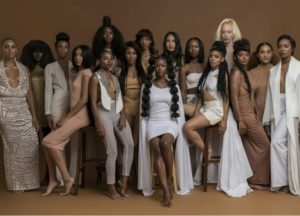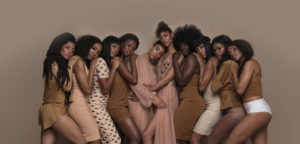I struggled to write this blog and for reasons other than writer’s block and lack of creativity. I struggled because I have to watch what I say and how I say it in fear of sounding too bold, too segregated, too black power-ish (is that a word?), too angry, too dramatic, too…well, black. See, that’s the problem. I have to be careful when expressing myself and my opinions even if backed by data. I may offend someone for being proud of who I am and, thanks to AncestryDNA, where I “may” come from. Another group may feel excluded from the movement, like #BlackLivesMatter shifting to #AllLivesMatter (Victor, 2016). On the flip side, I may sound “articulate,” which sounds like a compliment until someone is only impressed because they expected less of you. You see, there’s a lot that goes into talking about what #BlackGirlMagic really means because we are often not discussed anywhere else except amongst ourselves. That’s the reason why we are pushing as hard as our ancestors to be seen and heard on media platforms that many overtly and covertly think we still need to earn. Do you know what it feels like to be chosen solely for diversity sake? Well, check this out.
Last week, I was on a conference call with an integrated communications agency and PR firm for input on my job’s website. The goal of the call was to develop a marketing strategy that would attract people to the website and call them to action: donate, volunteer, or partner. The engagement would help us continue providing vital services to vulnerable, low-income seniors. The first advice we received was to replace the testimonial video on the homepage from a white male to a person of color, preferably a black woman. The second set of feedback was, “If you do not choose a black woman then at least make sure it’s a woman.” One white male, three white women and I sat in silence for what I perceived as my moment to speak now or forever hold my peace. I held my peace. (According to stereotypes this should be surprising.) They then proceeded to share insights on the importance of telling compelling stories of ethnically diverse populations and how impactful it is. The kicker? Our patient-base is made up of mostly white and Asian individuals. At that moment I felt like the poster child for all things low-income and underserved when I was actually one of two decision-makers on the call. A black woman in leadership being asked to tokenize her own for a charitable cause (Ho, 2017). Not exactly how I wanted to spend my morning but unfortunately, it happens all too often.
Black girls and women are one of the first to grace the pages of nonprofit marketing materials and the last to have a seat at the table in affluent and influential spaces. When we are invited, we must be ever-so-grateful to be the chosen one. Literally, only one. Our self-esteem has suffered because of it as we run back to our sisters for consolation. That consolation is affirmed across social media platforms through #BlackGirlMagic—a self-love movement coined by CaShawn Thompson five years ago after reading an article written by an evolutionary psychologist titled Why Are Black Women Rated Less Physically Attractive Than Other Women, But Black Men Are Rated Better Looking Than Other Men (F., 2017). See what I mean? We have to raise awareness and fight against racial inequality and gender injustice using our “magic” just to be deemed normal, both personally and professionally. So, when you see us celebrating ourselves, don’t feel left out. Don’t dim our light. Join the movement knowing that we probably had a rough call or two, struggled to write a blog post like this one or heard yet another story about the craziness we endure every day. Besides, celebrating #BlackGirlMagic does not mean others aren’t magical. It simply means we are working to increase our self-esteem in a not-so-magical world.
References
F., E. (2017). As #BlackGirlMagic turns four years old, CaShawn Thompson has a fresh word for all the magical black girls. Blavity. Retrieved from https://blavity.com/as-blackgirlmagic-turns-four-years-old-cashawn-thompson-has-a-fresh-word-for-all-the-magical-black-girls
Ho, K. (2017, September 18). 8 ways people of color are tokenized in nonprofits. Medium. Retrieved from https://medium.com/the-nonprofit-revolution/8-ways-people-of-color-\ are-tokenized-in-nonprofits-32138d0860c1
Victor, D. (2016, July 15). Why ‘All Lives Matter’ is such a perilous phrase. The New York Times. Retrieved from https://www.nytimes.com/2016/07/16/us/all-lives-matter-black-lives-matter.html



4 Responses to #BlackGirlMagic: Increasing Black Women’s Self-Esteem in a Not-So-Magical World